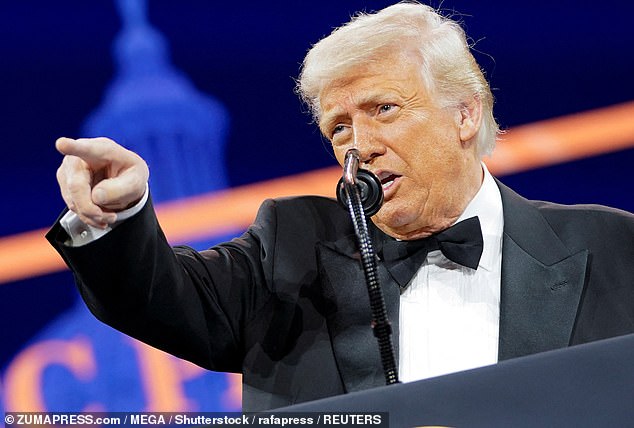Shares in Britain’s two biggest drugs firms saw more than £14billion wiped off their value after Donald Trump threatened to slap tariffs on pharmaceuticals imports to the US.
AstraZeneca, one of the largest companies in Britain, was the biggest loser in the FTSE 100 yesterday, slumping 6.8pc, or 707p, to 9667p.
It was followed by rival GSK, which tumbled 5.7 per cent, or 76.5p, to 1264p.
The slump in drugmakers’ stocks came after the US president said overnight that the US would soon introduce a ‘major tariff’ on pharmaceuticals to force firms to relocate medicine production to America.
‘We’re going to do something that we have to do. We’re going to put tariff on our pharmaceuticals and once we do that, they’re going to come rushing back into our country because we’re the big market,’ Trump said at a National Republican Congressional Committee dinner.
While Trump did not provide any additional details on potential levies on pharma imports, the fear of tariffs on drugs, which are currently exempt, sparked a swift sell-off.

Threat: US president Donald Trump (pictured) said overnight that the US would soon introduce a ‘major tariff’ on pharmaceuticals to force firms to relocate medicine production to America
Both AstraZeneca and GSK rely on the US for a large portion of sales, and while both have factories in the country, new tariffs could spark a rush to move more production to avoid being penalised.
European drugmakers also took a knock following Trump’s comments. Danish firm Novo Nordisk, the maker of Ozempic, dropped 6.9 per cent, while Swiss firm Roche fell 5.8 per cent, and France’s Sanofi slipped 6.9 per cent.
The rout also caught the US pharma sector, with Pfizer down 2.6 per cent and Eli Lilly falling 4.2 per cent.
Tariffs threaten to decimate the vast web of interconnected supply chains that link the US, UK and European pharma sectors together.
Bernstein analyst Courtney Breen predicted that if the tariffs were steep, the cost of US pharma imports could rise by as much as £42billion, denting the sales potential of medicines in the country.
Others predicted that such a move would do little to boost drug manufacturing in the US due to the complexity of the existing supply network.
There are also concerns that tariffs on the sector could add to growing difficulties in getting new medicines licensed in America, after it was announced that US health agencies, including the Food and Drug Administration, would sack 10,000 workers as part of a cost-cutting drive.
The move sparked warnings from analysts that the medicines watchdog could be ‘coming apart at the seams’ and pose a risk to public health.
DIY INVESTING PLATFORMS

AJ Bell

AJ Bell
Easy investing and ready-made portfolios

Hargreaves Lansdown

Hargreaves Lansdown
Free fund dealing and investment ideas

interactive investor

interactive investor
Flat-fee investing from £4.99 per month

Saxo

Saxo
Get £200 back in trading fees
Trading 212
Trading 212
Free dealing and no account fee
Affiliate links: If you take out a product This is Money may earn a commission. These deals are chosen by our editorial team, as we think they are worth highlighting. This does not affect our editorial independence.
This article was originally published by a www.dailymail.co.uk . Read the Original article here. .

